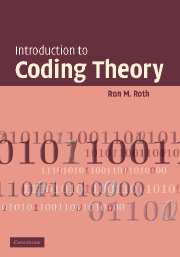Book contents
- Frontmatter
- Contents
- Preface
- 1 Introduction
- 2 Linear Codes
- 3 Introduction to Finite Fields
- 4 Bounds on the Parameters of Codes
- 5 Reed–Solomon and Related Codes
- 6 Decoding of Reed–Solomon Codes
- 7 Structure of Finite Fields
- 8 Cyclic Codes
- 9 List Decoding of Reed–Solomon Codes
- 10 Codes in the Lee Metric
- 11 MDS Codes
- 12 Concatenated Codes
- 13 Graph Codes
- 14 Trellis and Convolutional Codes
- Appendix: Basics in Modern Algebra
- Bibliography
- List of Symbols
- Index
10 - Codes in the Lee Metric
Published online by Cambridge University Press: 05 June 2012
- Frontmatter
- Contents
- Preface
- 1 Introduction
- 2 Linear Codes
- 3 Introduction to Finite Fields
- 4 Bounds on the Parameters of Codes
- 5 Reed–Solomon and Related Codes
- 6 Decoding of Reed–Solomon Codes
- 7 Structure of Finite Fields
- 8 Cyclic Codes
- 9 List Decoding of Reed–Solomon Codes
- 10 Codes in the Lee Metric
- 11 MDS Codes
- 12 Concatenated Codes
- 13 Graph Codes
- 14 Trellis and Convolutional Codes
- Appendix: Basics in Modern Algebra
- Bibliography
- List of Symbols
- Index
Summary
The study of error-correcting codes concentrates primarily on codes in the Hamming metric. Such codes are designed to correct a prescribed number of errors, where by an error we mean a change of an entry in the transmitted codeword, irrespective of the (nonzero) error value. The assignment of the same weight to each nonzero error value is reflected also in the model of the q-ary symmetric channel, where all nonzero error values occur with the same probability.
In this chapter, we consider codes in the Lee metric. This metric is defined over the ring of integer residues modulo q and it corresponds to an error model where a change of an entry in a codeword by ±1 is counted as one error. This type of errors is found in noisy channels that use phase-shift keying (PSK) modulation, or in channels that are susceptible to synchronization errors.
Our focus herein will be on GRS codes and alternant codes: we first study their distance properties in the Lee metric, and then present an efficient decoding algorithm for these codes, which corrects any error pattern whose Lee weight is less than half the designed minimum Lee distance of the code.
We also describe another family of codes in the Lee metric, due to Berlekamp. For certain parameters, these codes are shown to be perfect in that metric; namely, they attain the Lee-metric analog of the sphere-packing bound.
Information
- Type
- Chapter
- Information
- Introduction to Coding Theory , pp. 298 - 332Publisher: Cambridge University PressPrint publication year: 2006
